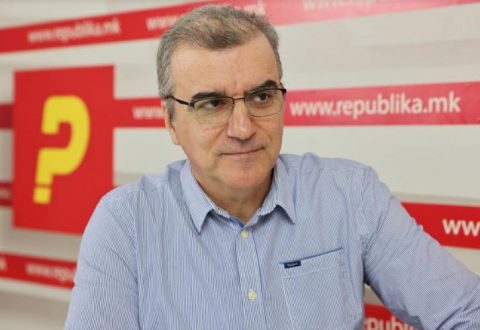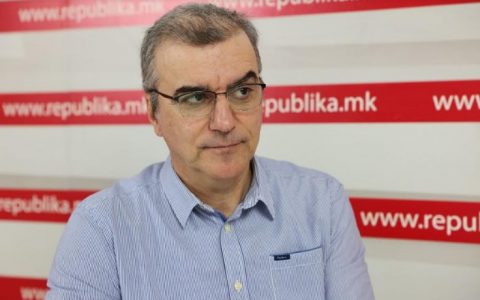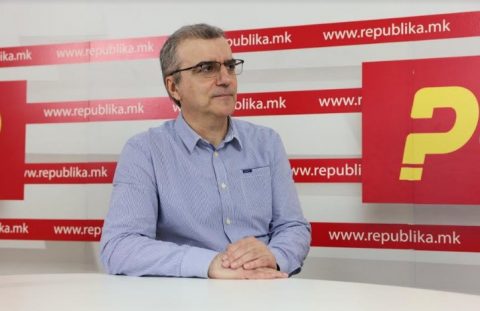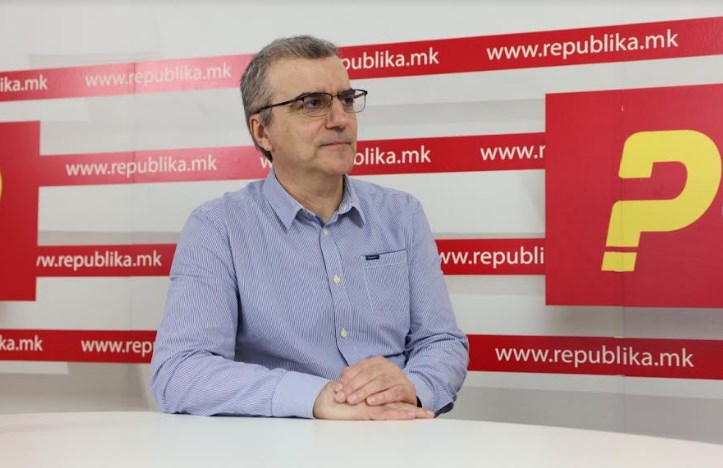Regarding whether Goce Delcev should be celebrated jointly by the Macedonian and Bulgarian people, my answer is no! Why do I say no? My research through the archives, the extensive literature read, and unpublished and published sources, indicate that the revolutionary activity of Goce Delcev has no contact points with Bulgarian history, except only sometimes his physical presence in Sofia and in some smaller towns in Bulgaria.

This, among other things, was stated by the university professor of history, Dr. Nikola Zezov, in an interview with “Republika”, ahead of February 4, when Goce’s 151st birth anniversary will be celebrated.
According to him, Delcev’s entire life, his entire revolutionary activity is dedicated to one of his ideals, which is the liberation of Macedonia from Ottoman rule and the creation of an autonomous Macedonian state as a step towards the independence of Macedonia.
Goce Delcev did not have any points of contact in terms of Bulgarian history. I have nothing against it if they want and consider as Bulgarian people that they should celebrate it, let them celebrate it in the Republic of Bulgaria and let them explain to their public why Goce Delcev is important for Bulgarian history. However, I am deeply convinced that there should be no joint observation. Unfortunately, Bulgarian politics wants to take advantage of that eventual joint honoring and portray Goce Delcev as part of the so-called “common history”, because they treat that “common history” as Bulgarian history. And starting from that, I think that there should be no joint observation, emphasizes Prof. Zezov.
He, as he says, is deeply convinced and wants to believe that incidents will not occur, although information coming from different sides in this sea, in this stream of information, indicates that it is possible for such a thing to happen.

That’s why, I call on all Macedonians, who will go to celebrate Goce Delcev’s birthday on that day, to do so with dignity and pride and not succumb to any provocations, Prof. Zezov said.
Prof. Zezov also gave us an explanation of his position expressed in his latest TV appearance that this generation of Macedonians lost the battle, but not the war.
I said that as a kind of symbolism, but my views are due to the fact that the Republic of Macedonia is really now in a defensive state. We have suffered more setbacks with the concluded agreements with the Republic of Bulgaria and the Republic of Greece and hence my expression that the battle is lost, but conditionally speaking that the “war” will continue. The Macedonian issue has always been a kind of a Gordian knot in the Balkans.
The solution, no matter how much someone tries to be in his favor, if he does not take principled positions, then we will still have many enigmas, which will continue in the future to affect it and determine the degree and development of the Republic of Macedonia and the Macedonian question. From there, that battle, the battle of our generation, will be transferred to our future generations, to our children and grandchildren, who will surely know how they will have to act in the events to come, he says.
Regarding the incident in Ohrid with the secretary of the Tsar Boris III club, Hristijan Pendikov, who felt like a Bulgarian, and what, in fact, was his goal, whether the Macedonians were once again portrayed as tyrants and thugs or as an opportunity to provoke the Bulgarian citizens to come to Skopje en masse, which will then be used to present as the first join honoring of Goce Delcev, prof. Zezov says:

As the Macedonian public, we know very well that the Republic of Bulgaria is once again in a pre-election period. The main reason for this incident is, in fact, the elections in Bulgaria, which, unfortunately for them, was unable to form a government. That is why they needed such unfortunate events, and incidents, which I sincerely regret and am against violence in any form for any reason. However, this incident in Ohrid will be used to make the Bulgarian political parties compete in the pre-election to see who will speak more about Macedonia. Essentially and throughout history, the Macedonian issue has always been the main topic of Bulgarian political parties. And for those reasons, I think this incident was caused. Therefore, once again I urge the majority of the Macedonian public, which will watch this show, not to succumb to these provocations. Of course, these provocations have a well-thought-out background in advance. If we as Macedonians get into that violent scenario, the biggest loser will be Macedonia and the Macedonian people. So we should be quite calm and rational. Of course, we should defend our national and state interests, but let’s do it in a different way, not like this, with violence that I condemn, regardless of the motives and reasons for it.
About whether a solution for Goce Delcev is possible at the upcoming February meeting of the Macedonian-Bulgarian joint commission on issues of history and textbooks and in which direction it would go, prof. Zezov is adamant again:
No, there will be no solution and I have repeatedly emphasized that the historical commission and its work are already irrelevant and unnecessary. In fact, the genesis and source of all these problems that we have today is that famous Agreement signed on August 1, 2017. That unfortunate adjective for us Macedonians for “common history” is the generator of all the problems we have now. Macedonian and Bulgarian historians can’t find any common point for joint celebration of Goce Delcev.
Is history repeating itself as a farce or as a tragedy? The question was in the context of the report of this government composition and the perspectives for the year, in the center of attention of which were the constitutional amendments for including the Bulgarians into the Constitution, which was done in a very unfortunate way. Because, in the style of the famous Tito postulates and communist doctrines, from the divisions of the national fabric after the war with the question of whether to go to Thessaloniki or Srem or whether you are for Tito or Stalin, now Prime Minister Dimitar Kovacevski and First Deputy Prime Minister Artan Grubi told us that those who are against constitutional amendments are also against EU membership.

In response to this question, I will immediately highlight the announced declaration of the Bulgarian assembly, which will probably be voted on these days. There, in point 7, I think it says, where it says, paraphrased, that no one can deal with the Bulgarian history and past in the Republic of Macedonia, because it will be treated by the Bulgarian state as an anti-Bulgarian campaign and anti-state rhetoric. Look at that article 7 and you will see how far Bulgaria is going with this second declaration in a short time. We will be forbidden to speak on Macedonian historical topics because they will be treated as part of the Bulgarian historical past. Why am I emphasizing this? If it were a natural situation like in a Western European country, the question of including a smaller ethnic community into the constitution would be a benign question. However, where is the catch here? I think that this trap is also clear to the last unfaithful Thomas in Macedonia because the eventual inclusion of Bulgarians in the Macedonian Constitution will open an institutionalized form for the further action of Bulgarian propaganda in Macedonia and for the “awareness” of new Bulgarians because we know that this is an instrument of Bulgarian propaganda for action in Macedonia.
Based on this knowledge, which I have and which is my personal position and not everyone has to agree with it, I think that Bulgarians should not be included in the Constitution of the Republic of Macedonia. Because the situation is so complicated and difficult when it comes to Macedonian-Bulgarian relations and we will probably return to the point, or the degree as from the time of the Information Bureau in 1948, when the cultural autonomy of the Macedonians in the Pirin region of Macedonia was abolished due to the conflict of Soviet Russia with Yugoslavia and where the Macedonian issue was collateral damage. The same would probably happen to us now.
I think that if we continue at this pace to harm Macedonian national interests, not only will Macedonian-Bulgarian relations not improve, but unfortunately, they will deteriorate even more in the future. Let us remind you that 2023 is the jubilee year for many historical events. This year we should celebrate the 120th anniversary of the Ilinden Uprising, do you think there will be no Bulgarian provocations from certain political factors? I’m sure there will be. This year, on May 4, it will be 120 years since the murder of Goce Delcev, here again, is a date when such unpleasant events and tensions can happen to us, which will only strain the Macedonian and Bulgarian people even more, not through their fault, but because the fault of the aggressive Bulgarian policy towards Macedonia and the Macedonian issue, says Prof. Zezov.
Listen to the entire conversation in the video interview conducted by Predrag Dimitrovski




Comments are closed for this post.